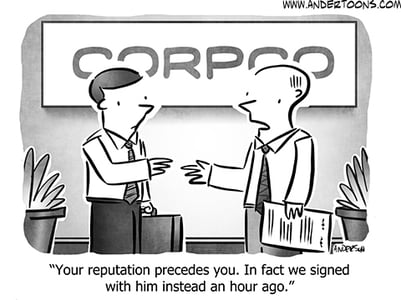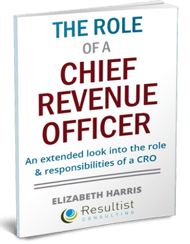
The purpose of the Chief Revenue Officer (CRO) is to drive organic revenue growth by leveraging each revenue-generating function and department within your organization.
This is a position that was born in the Silicon Valley SaaS sector, but it's no longer isolated to the tech space. More companies are finding value in adding the CRO position to their C-suite, from startups to Fortune 500 companies.
Whether you're a company like Continental Airlines, which has had a CRO for nearly two decades, or a business that is just realizing the value of this position, it's a specialized role. Here is what a CRO can bring to the table and what you need to know to find your company's next CRO.
Does Your Company Need a Chief Revenue Officer?
The goal of just about any business today is understandably similar: grow revenue efficiently, predictably, and as fast as possible. Yet, many businesses aren't sufficiently structured to achieve this goal.
Directors of marketing, operations, and heads of sales have created silos of activity that can be territorial and stifle productivity. Even worse, they ignore the true goal of growing revenue.
While other business processes such as distribution and inventory control have improved significantly thanks to innovations in supply-chain technology, the revenue process remains shockingly inefficient by comparison.
Consider this statistic: Sales reps spend roughly 40% of their time figuring out how to best spend their time. If this were taking place on a factory floor, where robots spent nearly half their processing time deciding what to do next, the company would be in serious peril.
Since the other aspects of your business probably run fairly efficiently, it's time to take a closer look at the way you treat revenue. This is where the Chief Revenue Officer (CRO) steps in, which is an executive role that manages revenue from the top down, across the entire process.
Many companies have people in roles that are related to the financial health of the company. These might be revenue analysts, accountants, and accounts payable managers, all potentially reporting to the CFO and giving a rear-view mirror look at the figures. But it also makes sense to lead revenue from the front, which is something that the CRO does, working in synch with other top managers.
How a CRO Adds Value to Your Business
Whether you are a startup or an established business, a tech company or a manufacturing concern, a CRO can give your organization the competitive edge it needs to achieve rapid revenue acceleration. This position has ultimate accountability for driving revenue growth, by aligning and leveraging every revenue-generating department: Sales, Marketing, and Customer Service/Support.
The CRO's job is to find out where new approaches will be beneficial, and to leverage the talents of everyone on the team to produce higher revenue. By virtue of the role's influence across Sales, Marketing, Service, and other key departments, this position adds value to your business in a variety of ways.
- CROs help create more compelling value propositions.
Some amazing things can happen when you leverage the insights of Sales with the capabilities of Marketing. These are disciplines that should be working together but are often at odds in a traditional corporation. A CRO can harness feedback from a variety of sources to find out what the customers really want and then create the right message that will produce more conversions and higher retention levels.
- CROs make resources that touch customers more productive.
When there are separate departments, it becomes simple enough to pass the buck for different responsibilities and even failures. The CRO can use their knowledge of sales coverage and customer needs to connect the right resources with customers and make each function within the organization more productive. The CRO can also ensure that there are measurable goals for each function that add up to desired revenue growth.
- CROs foster a more communicative, collaborative culture.
When collaboration becomes the norm with a CRO on board, more people within the company become willing to change to achieve shared goals. Instead of protecting their own turf, programs for revenue growth are established that have a broader perspective, which is one that serves the customer. This collaboration also gives birth to more innovation, where increased dialog allows the team to identify and assimilate the best ideas and put them into action.
- CROs enable both learning and speed.
You'd probably like to jumpstart your revenue growth sooner rather than later, and an investment in a CRO is an excellent start. Markets change quickly, and a CRO will be in a better position to collect real-time feedback and suggest necessary changes or even new products that will deliver the most value to your company. Hiring a CRO is a tactical investment that will deliver financial benefits in both the short and long-term.
How and Where to Find Your Next CRO
You may be convinced that a CRO is a must-have for your business, but the next step is still a mystery. Specifically, how you do find the right person to fill this specialized role and where to do you look?
 Sure, you could just give an existing employee this title, but this will far from guarantee that you'll get the value-added performance your company needs and desires. Before you fill this position, here is a list of qualities that you should look for in a game-changing CRO.
Sure, you could just give an existing employee this title, but this will far from guarantee that you'll get the value-added performance your company needs and desires. Before you fill this position, here is a list of qualities that you should look for in a game-changing CRO.
- Seasoned C-Suite Executives. The Harvard Business Review released a study revealing that 75% of cross-functional teams in leading corporations are dysfunctional. Your next CRO should know how to navigate the C-suite and boardroom effortlessly. In other words, in a position that requires bringing top managers together and bucking the norms, this shouldn't be a learning or trial and error experience.
- Sales, Marketing, CRM, and Service Geniuses. Companies used to (and some still do) judge their success based on raw sales figures and net quarterly profits. But most companies are learning that a more holistic approach to growth is also more profitable. Based on six years of research, McKinsey found that companies that optimized the customer journey increased their annual revenue by up to 10%. The right CRO will tear down existing silos and align every discipline to create the best customer experience possible.
- Data-Driven Professionals. The right CRO is going to know how to interpret massive amounts of data and use analytics to make business decisions that will drive revenue growth. For example, Cisco saw 48% growth in recurring subscriptions and software sales in Q12017 thanks to its proactive use of data to address consumer issues and drive more predictable revenue.
- Tech Savvy Experts. An effective CRO must be tech savvy for several reasons. First, they'll need to know how your company's product works to sell it properly, including how it integrates with a client's systems. Second, artificial intelligence (AI) and big data are continuing to evolve and will be catalysts for revenue growth in most organizations.
- Team Building Directors. Your CRO will be the leader of a much larger initiative. If they hope to successfully implement a successful revenue-generating plan, others need to be brought on board. This might involve recruiting and hiring new talent or convincing those that are already there to join the team.
Now that you have some qualifications as benchmarks, you might have someone internally that fits the bill. Your first step should be to establish a reporting structure, list of responsibilities, and position summary.
While you may be able to fill the position from within your ranks, don't feel pressured to do so. Some of the best options for finding top CRO candidates include referrals from established connections, shakeups in the industry (i.e., possible closure of a startup), and guidance from an executive search firm.
A CRO is much more than just a glorified VP of Sales. This is a specialized position that will add value to your company, with the goal of boosting revenue and bottom-line results.
If your company needs additional help defining the CRO position or would like assistance with filling this role, find out more about how Resultist can help.
 The Role of a Chief Revenue Officer
The Role of a Chief Revenue Officer
This eBook will help you study and define the role of a Chief Revenue Officer in depth which should prove the job of a CRO is more than just a glorified VP of Sales. With a more thorough understanding of the CRO role, you will be better prepared to develop your company’s business model, ensure market sizing, Go-To-Market strategy, pricing and packaging, sales skills and organization model, while staying in alignment with the company's vision.
